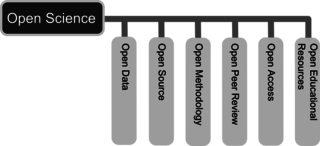Open science is the movement to make scientific research, data and dissemination accessible to all levels of an inquiring society, amateur or professional.
It encompasses practices such as publishing open research, campaigning for open access, encouraging scientists to practice open notebook science, and generally making it easier to publish and communicate scientific knowledge. - wikipedia ![]()

The group who drafted the Panton Principles at the Panton Arms, September 2009/ Jenny Molloy, Jordan Hatcher, Rufus Pollock, John Wilbanks, Cameron Neylon, Peter Murray-Rust, Carolina Rossini
- wikimedia.org ![]()
Science is broadly understood as collecting, analyzing, publishing, reanalyzing, critiquing, and reusing data. Proponents of open science identify a number of barriers that impede or dissuade the broad dissemination of scientific data - wikipedia ![]()
YOUTUBE DnWocYKqvhw Open science: Michael Nielsen at TEDxWaterloo (2011)
These include financial paywalls of for-profit research publishers, restrictions on usage applied by publishers of data, poor formatting of data or use of proprietary software that makes it difficult to re-purpose, and cultural reluctance to publish data for fears of losing control of how the information is used - wordpress ![]()

Open science. scientific research performed in public
- wikimedia.org ![]()
According to the FOSTER taxonomy Open science can often include aspects of Open access, Open data and the open source movement whereby modern science requires software in order to process data and information - h-online.com ![]()
Open research computation also addresses the problem of reproducibility of scientific results. The FOSTER Open Science taxonomy is available in RDF/XML ![]() and high resolution image
and high resolution image ![]() .
.
# Different Types of "Open Science"
The term "open science" does not have any one fixed definition or operationalization. On the one hand, it has been referred to as a "puzzling phenomenon". On the other hand, the term has been used to encapsulate a series of principles that aim to foster scientific growth and its complementary access to the public. Two influential sociologists, Benedikt Fecher and Sascha Friesike, have created multiple "schools of thought" that describe the different interpretations of the term - openingscience.org ![]()
According to Fecher and Friesike ‘Open Science’ is an umbrella term for various assumptions about the development and dissemination of knowledge. To show the term’s multitudinous perceptions, they differentiate between five Open Science schools of thought:
# Sections
# See also